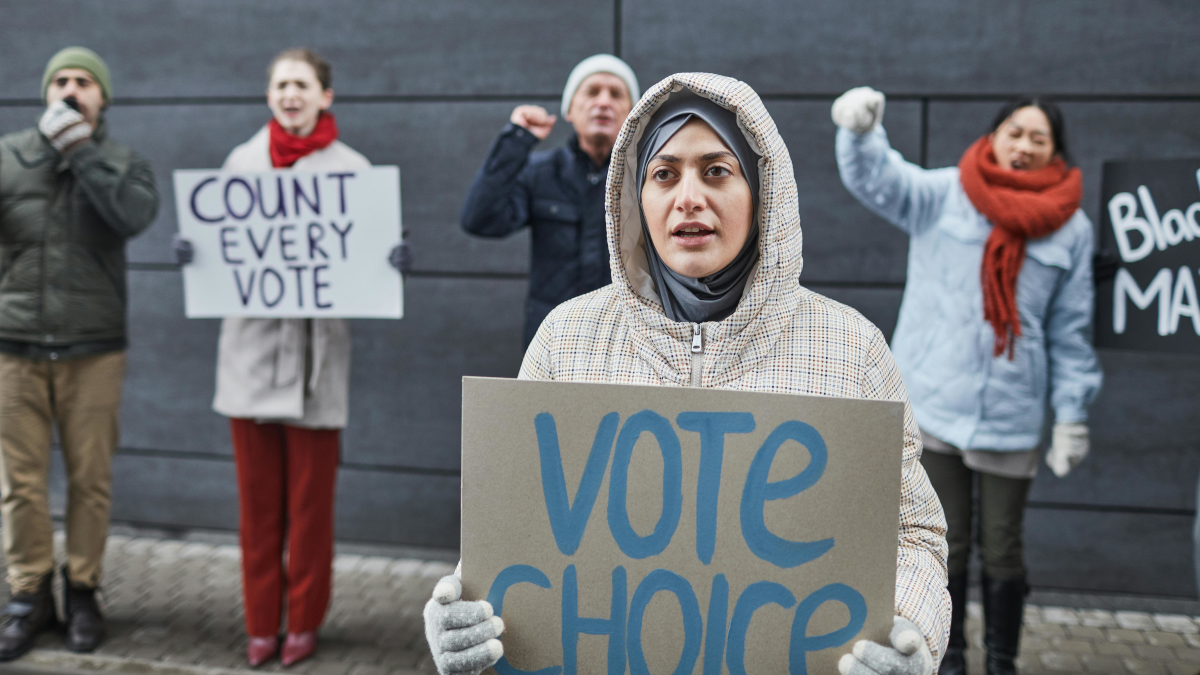Only 46% of Americans aged 18-29 voted in their last election. In the UK it was hardly better, at 50%. These figures compare with the overall turnout in the low 60s in the US and high 60s for Britain.
Famously in Britain, it is claimed how, if more younger people had voted, then the Brexit vote may have been to remain.
These figures seem particularly strange at a time when according to research by the Stockholm-based International Institute for Democracy and Electoral Assistance, there is an increase in ‘other forms of citizen activism, such as mass protests, occupy movements and increased use of social media as a new platform of political engagement.’
‘Am I bovvered?’
So why can’t younger people be ‘bovvered’ when it comes to an election?
- There is a general distrust of mainstream politics and politicians, coupled with a feeling that all the big parties are all basically offering the same thing. ‘Young people’s faith in democratic politics is lower than any other age group, and millennials across the world are more disillusioned with democracy than Generation X or baby boomers were at the same stage of life’, according to a report from the Centre for the Future of Democracy at the University of Cambridge.
- Politicians aren’t using social media well enough — Rishi Sunak has 2.3m followers on X, while Sir Keir Starmer has less, at 1.4m. However, these just aren’t very high figures — actor Emma Watson has a mere 27.1m and singer Taylor Swift has 95.2m.
- Voting mechanisms just don’t work for them. While politicians argue about postal votes, these generations (indeed most of us) live online. Having to visit a polling station and now (in the UK) take photographic ID with you just doesn’t appeal. It’s a hassle in a world that people want to be seamless and easy to use. In a recent House of Parliament paper Rachel Gibson concludes that, for online voting, ‘there is evidence that less engaged and non-voters have been drawn into voting for the first time’. And that ‘Evidence from Estonia, one of the leading nations in taking internet voting forward, has shown an appeal to younger people.’
Change
Change is a word that seems beloved by politicians, from Obama to Starmer, but how could marketing help engage the younger generation and them to vote? Here are my six ‘steps’ (not sure I can call them pledges):
- Following on from above, change the ‘route to market’ and introduce online voting. Yes, it would need suitable security protocols, but if the banks can do it with our money, it shouldn’t be beyond the government to develop a secure system so people can vote from their phone, tablet or computer.
- Communicate the differences between the core philosophies and key policies of the different parties. This is marketing 101; make your offer distinctive and appealing, don’t just knock the competition.
- Find younger spokespeople — people nearer in age to these current non-voters. You would want someone who isn’t scared to make provocative statements and claims. Think Greta Thunberg in full flow, laying down the consequences of not voting.
- Engage with social media in ways that this generation can relate to. Indeed some of the latest meme-styled approaches being used by The Labour Party are showing that they seem to be starting to think this way.
- Get the influencers influencing. Despite the fact that she is currently sitting on the fence, saying ‘Vote the people who most represent YOU into power,’ The Guardian still thinks Taylor Swift might have a role to play in determining the outcome of the US election. They ran an article with the headline ‘The voting bloc that could decide the US election: Swifties’.
- Make sure they understand the consequences for them, not just their parents and grandparents. One of marketing’s oldest mantras: tell them what’s in it for them. Brexit has curtailed travel and work opportunities, and kept up-and-coming bands from visiting the UK, and UK bands touring abroad. Interestingly, it is something Rachel Reeves has said Labour will address if elected — a commitment which probably hasn’t got the coverage it deserves.
So, in what is being dubbed ‘The Ultimate Election Year’ with at least 64 countries and the European Union planning to hold elections, isn’t it time we tried harder to engage more of the younger generations to help decide the outcomes?
Featured image: Edmond Dantès / Pexels

